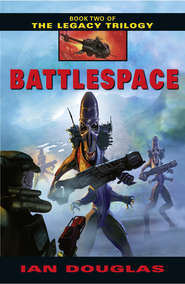По всем вопросам обращайтесь на: info@litportal.ru
(©) 2003-2024.
✖
Singularity
Настройки чтения
Размер шрифта
Высота строк
Поля
He watched as Jeanne d’Arc continued to bleed water into space.
How, he wondered, was Koenig going to handle this one? …
Chapter Four
11 April 2405
CIC
TC/USNA CVS America
Kuiper Belt, HD 157950
98 light years from Earth
0940 hours, TFT
“Admiral Giraurd,” Koenig said, standing. “Welcome aboard.” He kept his voice and his expression pleasant, even mild. It was important at this point to avoid any sense of drama.
Testosterone-laced posturing would not help at all at this point.
“Koenig,” Giraurd replied with a curt nod. “You still have the option of surrendering.”
“I think, sir, that I will decline that privilege.”
They were meeting physically instead of through virtual communications, within the spacious officers lounge in America’s hab modules. Present were Captain Buchanan and most of Koenig’s command staff and, just in case, several Marine guards flanking the doors as unobtrusively as they could considering that they were in full combat armor. Koenig and the other USNA officers wore full dress; Giraurd wore his command utilities, a blue jumper with the gold emblems of his rank on the shoulders and down the left sleeve.
“You are making an enormous mistake,” Giraurd said, taking an offered seat.
“Perhaps.” Koenig sat down as well, watching Giraurd across a low table grown from the deck. “But if so, I risk losing my command and, possibly, my fleet. If you and the Conciliationists are wrong, however, we could lose all of humanity. Our species could become extinct. Can you understand my point of view?”
Giraurd hesitated, then gave another nod. “I suppose so. But it is not for the military to make political decisions of this magnitude. You, of all people, should know that.”
Giraurd, Koenig knew, was referring to the peculiar political baggage the USNA derived from two of its predecessors—Canada and the United States of America. In those nation-states, the military had been expressly forbidden to participate in political decisions. While military coups had not been unthinkable, certainly, they’d been extremely unlikely when the military’s commander-in-chief had been the civilian president.
It was a tradition not all members of the Terran Confederation shared. Giraurd was chiding him for breaking that tradition, for making what was essentially a political decision without going through a democratic process.
“Out here,” Koenig said quietly, “we have to make our own decisions. They don’t see what we see, not from a hundred light years away.”
“And suppose your little raid behind the enemy lines backfires, Koenig? Suppose it brings down upon us the full weight of the Sh’daar?”
“In other words,” Koenig replied gently, “what if we make them angry? Earth lost sixty million souls during their last foray into the Sol System. It’s hard to see how they could be any madder.”
During the Defense of Earth, in October of 2404, a twelve-kilo mass traveling at a significant fraction of c had skimmed past the sun and slammed into the Atlantic Ocean, 3,500 kilometers off the North American seaboard. The resultant tidal waves had scoured the coastlines of North and South America, Africa, and of Europe, killing an estimated 60 million people.
“Perhaps,” Giraurd said. “We might not be so lucky with another direct attack on Earth. That impactor might have simply been a demonstration of their power. We would not survive a determined attack.”
“I agree,” Koenig said. “And that’s why we’re out here. Even the Sh’daar don’t have unlimited resources. If we pose a threat to their worlds, to their star systems and the systems of their allies, we’ll draw them away from the Confederation.”
“You are a fly attacking an elephant, Koenig.”
“Perhaps. But elephants, I will remind you, are extinct. Earth still has lots of flies.”
“Listen to what I am saying! My point is that the Sh’daar and their allies, the Turusch, the H’rulka, the Nungiirtok, and others, are too big, too powerful, for Earth to face alone!”
“I hear what you’re saying, Grand Admiral. My point is that Earth needs time, and I’m attempting to buy that time. I’m not against negotiating. I’m just hoping we can negotiate with the Sh’daar when they’re not holding a gun to our head!”
“And if we give in to the Sh’daar demands … what is the worst that will happen? We give up our insane gallop into a world of ever higher and higher technology! We become content with what we have! We avoid the Vinge Singularity! And what would be so bad about that?”
Giraurd was referring to a long-expected exponentiation of human technology, sometimes called the Technological Singularity, when human life, blending with human technology, would pass out of all recognition. It was named for a late-twentieth-century math professor, computer scientist, and writer who’d pointed out that the rate of increase in human technology had fast been approaching a vertical line on the graph, and that had been in 1993. When the Sh’daar had delivered their ultimatum almost four centuries later, they’d demanded that Humankind stop all technological development and research, especially in the fields of genetics, robotics, information systems and computers, and nanotechnology. These so-called GRIN technologies were seen as the principal drivers in the coming Technological Singularity; arrest them, and human life might not evolve into something unrecognizably alien.
“I don’t know,” Koenig admitted. “But I do think we deserve to make our own mistakes.”
“The Sh’daar seem terrified of the Singularity,” Giraurd said. “Perhaps it is with good cause.”
“Terrified of the Singularity itself?” Koenig asked. “Or of what happens if another technic species like us reaches it?” He shrugged. “In any case, if it’s a mistake, it’s our mistake. We should not allow ourselves to be protected from it by the Sh’daar or anyone else. And more than that … don’t you think we should make our own decisions about our future and about who we’re going to play with as we move out into the galaxy? If the Sh’daar fold us into their little empire, they’ll use us like they use the Turusch and the others, right? As frontline warriors? Damn it, Admiral, the Confederation military will end up working for them, puttering around the galaxy putting down upstart technic species … species like we are now. That is, unless they decide to just turn us all into slaves and be done with it!”
“I hadn’t realized, Admiral Koenig, that you were a xenophobe.”
“I am not, Admiral Giraurd. But I do believe in self-determination for my species!”
The two men glared at each other for a moment across the table. Gradually, Koenig relaxed. He’d hoped to get the Pan-European admiral to see reason—as, no doubt, Giraurd had hoped for him—but the argument was going nowhere. Giraurd would not change his mind, and neither would Koenig.
“I see no reason to continue this discussion, Admiral,” he said. “How badly was the Jeanne d’Arc damaged?”
“Our water reserves are gone,” he said with a Gallic shrug. “Repair robots are working on the breached tanks now.”
“I’ve given order that the battlegroup’s repair and fabrication ships be deployed to lend you a hand. There were no casualties?”
“No. Your fighters were … surgically precise.”
In 1921, General William Lendrum “Billy” Mitchell had argued, then demonstrated, that aircraft, only recently emerged as military weapons, could sink battleships. Within another twenty years, air attacks against naval fleets at Taranto and Pearl Harbor would completely change the way wars were fought at sea, but in 1921 the idea was not merely revolutionary, but heretical.
Young Lieutenant Gray had demonstrated a similar principle, one now well known within the military and political hierarchies back home but frequently ignored: a twenty-two-ton fighter could disable a capital ship a kilometer long and massing millions of tons. The trick was in slipping it in exactly where it would be most effective, with enough firepower to overcome the target’s gravitic shielding. Surgical precision, as Giraurd had put it, made possible by advanced technology, was the only means by which a lone gravfighter could take down a far larger foe.
Something of the sort would be necessary if the Terran Confederation was going to win over the Sh’daar.
“The intent was to stop you, Admiral,” Koenig said. “Not hurt you.”
“I could wish, sir, that you had destroyed the Jeanne d’Arc … and me with her.”
Giraurd’s emotional pain showed for a moment, but Koenig ignored it. The man would have to explain his failure later, in front of the Senate Military Directorate. It might even mean the end of his career.
Welcome to the club, Koenig thought.
“Do you anticipate any problem getting the Jeanne d’Arc ready for Alcubierre Drive?”
“No. The damage is superficial. But we will need to take on water.”











